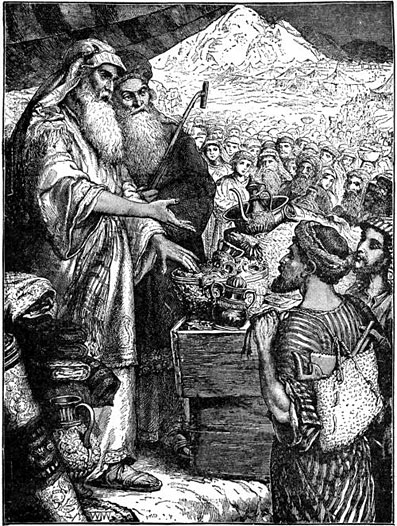Aug
4
2010
or Festivals from the Abyss

Herod, when he saw that he was deceived by the wise men, was exceedingly angry; and he sent forth and put to death all the male children who were in Bethlehem and in all its districts, from two years old and under, according to the time which he had determined from the wise men. Then was fulfilled what was spoken by Jeremiah the prophet, saying: “A voice was heard in Ramah, lamentation, weeping, and great mourning, Rachel weeping for her children, refusing to be comforted, because they are no more.” Matthew 2:16-18
Continuing from New Covenant Virility – 2
GLORIFICATION: (Tabernacles feast, marriage, children, rest)
Wow. This last bit really rubs in the kind of offspring (fruit) Israel gave God. It is the seventh stanza of this section, yet in itself it has seven stanzas. Each section submits itself to the common themes in Glorification, yet each section reiterates one step the sevenfold pattern. Tabernacles was the big feast, so in this final ascerbic prophecy, the prophet turns the annual Feasts into curses. [1] What sublime poetry is Isaiah.
Tabernacles is the Feasts of Booths. It is God’s people reaching maturity as a great tree and sheltering the nations. The cycle began with dry trees (eunuchs, etc.) being made fruitful. Here, God lays the ax to the root of the old tree.
Continue reading
1 comment | tags: Altar of the Abyss, Cyrus, Darius, Esther, Isaiah, Solomon, Tabernacles, Un-Passover | posted in Bible Matrix, Biblical Theology, The Restoration Era
Jul
3
2009
“Be meticulous to present yourself for the praise of God as an unashamed workman, cutting the word of truth in a straight line.” (II Timothy 2:15)
Is this verse simply teaching that if we “divide up” the Scriptures correctly, we’ll get an AWANA[1] merit badge from God? Hardly. It is flanked by condemnations of those who fight over the Scriptures to no profit, and those whose vain babblings are gangrenous.
Paul speaks of a soldier and a farmer, and then a productive workman. Paul is concerned about building saints and churches, and they are built by a straight and true cutting of the word. Like most of Paul’s statements, there is a very long, fully-loaded freight train of Old Testament history and typology right behind it, and it’s coming right at you, right now.
Continue reading
Comments Off | tags: Darius, David, Esther, Ezekiel's Temple, Nebuchadnezzar, New Jerusalem, oikoumene, Peter, Peter Leithart, Postmillennialism, Revelation, Solomon, Stigmata, Temple, Totus Christus, Worship | posted in Biblical Theology, Christian Life, The Last Days, The Restoration Era
Apr
8
2009
“…though Jews returned to the land after the decree of Cyrus, they did not enjoy the fruits of it (Haggai 1:1-11). They were still alienated from the land. They did not really occupy it until they rebuilt the Temple, which was completed in the sixth year of Darius, 20 years later.”1
Darius listened to those who opposed the Jews and ordered the Temple reconstruction to officially cease, so the Lord raised up two witnesses, Haggai and Zechariah. Haggai would chastise the people for neglecting the house of God, and stir up their hearts to finish it. Zechariah would deal with the spiritual war going on behind the scenes.
Zechariah’s visions perform the same function as Abram’s animal sacrifice. (In Abram’s time, there was a famine in the Land, and later it did not support Abram and Lot’s flocks). In Zechariah, the mediator who is “passed over” is not Abram but Joshua the High Priest. The sins are atoned for again, but not with animal sacrifices. In Zechariah it is the Angel of the Lord who steps in, chases away the accusations of Satan (as the ravens), and provides clean robes as a New Covenant.
Then the Temple could be completed, and the abundant fruits of a recreated Land were enjoyed by a new Israel.
________
1 James B. Jordan, Jubilee,
Biblical Chronology Vol. 5, No. 4, www.biblicalhorizons.com
Comments Off | tags: Abraham, Atonement, Covenant curse, Cyrus, Darius, Famine, Haggai, High Priest, James Jordan, Lot, Temple, Two witnesses, Zechariah | posted in The Restoration Era



























